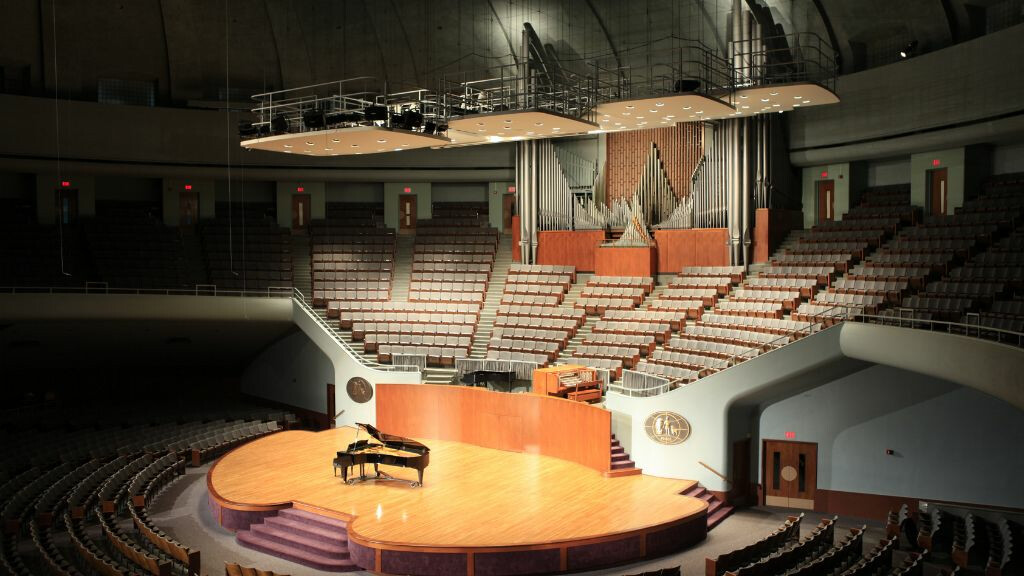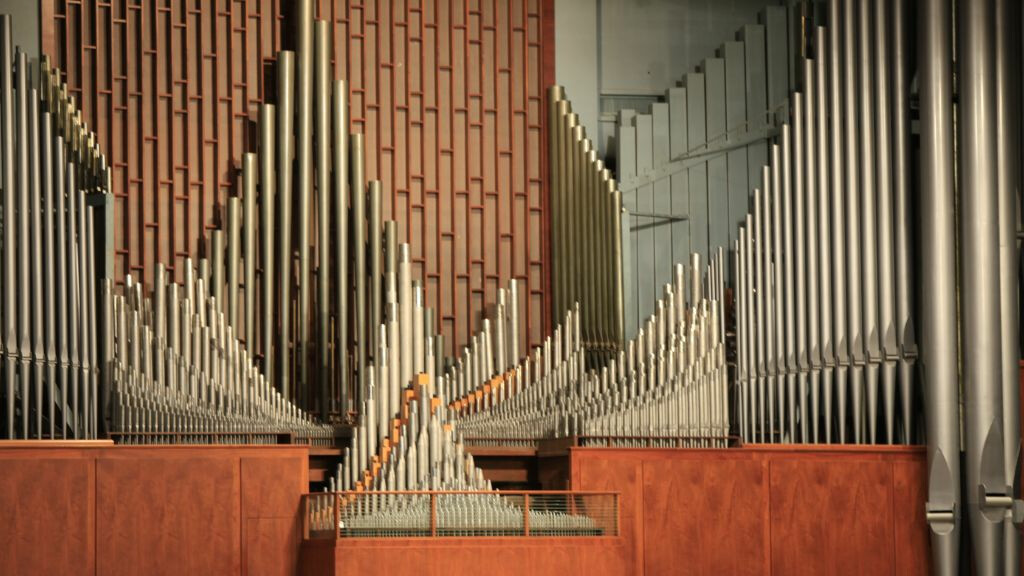Aeolian-Skinner Opus 1309: A Historic Masterpiece
About the Auditorium Organ
The Auditorium Organ, crafted by the renowned Aeolian-Skinner Organ Company of Boston, Massachusetts, stands as a monumental example of mid-20th century organ building. Installed in 1959, this organ is celebrated as one of the company’s most significant works.
Key Features and Specifications
Visual Centerpiece
The organ’s exposed Great, Positiv, and Pedal pipework create a striking visual focal point in the vast conference chamber, which seats nearly 5,800 people.
Architectural Marvel
The organ is framed by nineteen acoustical clouds and a large rostrum, all under a massive dome with an oculus 100 feet above the floor.
Design Legacy
Initially designed by Donald Harrison, a leading figure in organ building, and completed by Joseph Whiteford with consultants Catharine Crozier and Harold Gleason.
The American Classic Organ
The Auditorium Organ exemplifies the “American Classic Organ” design, blending German and French organ traditions with 20th-century innovations. This design allows for a versatile performance of a wide range of organ literature.


Tonal Foundation
32’ Principal Stop
The organ’s foundation is a 32’ Principal stop, with pipes ranging from nearly forty feet to the size of a pencil, providing a rich tonal gravity.
Four-Manual Console
The organ is played from a solid walnut four-manual console positioned above the rostrum.
Antiphonal Organ
An antiphonal organ with three divisions is located at the opposite end of the chamber, playable from both a two-manual console in the rear balcony and the main console. A notable feature is the Trompette en chamade, a bold set of horizontal trumpets.
Modern Enhancements
Over the years, additional ranks have been added to enhance the organ’s flexibility. The instrument now includes solid-state relays, combination action, and a MIDI system with digital record/playback capabilities.
Specifications
- Divisions: 9
- Ranks: 113
- Pipes: 6,334
Great
Manual II (exposed, 4" wind pressure)
16’ Sub Prinzipal
8’ Prinzipal
8’ Spitzprinzipal
8’ Flûte Harmonique
8’ Bourdon
4’ Principal
4’ Gemshorn
4’ Rohrflöte
2 2/3’ Quinte
2’ Doublette
II Sesquialtera (2 2/3’)
IV-VI Mixtur (1 1/3’)
IV Scharf (2/3’)
16’ Kontra Trompete (console preparation)
8’ Trompete
Tremulant
8’ Trompette en Chamade (Bombarde)
Positiv on Great
Swell
Manual III (enclosed, 5" wind pressure)
16’ Gemshorn
8’ Geigen Prinzipal
8’ Viole de Gambe
8’ Viole Céleste
8’ Rohrflöte
8’ Flûte Douce
8’ Flûte Céleste
4’ Praestant
4’ Flûte Harmonique
2’ Octavin
III Plein Jeu (2’)
III Acuta (2/3’)
16’ Contre Trompette
8’ Trompette
8’ Hautbois
8’ Vox Humana
4’ Clairon
Tremulant
Positiv on Swell
Choir
Manual I (enclosed, 5" wind pressure)
16’ Contre Gambe
8’ Viola Pomposa
8’ Viola Céleste
8’ Gedackt Pommer
8’ Dolcan
8’ Dolcan Céleste
4’ Principal
4’ Nachthorn
2’ Blockflöte
IV Mixtur (1’)
16’ Fagot
8’ Cromorne
4’ Trompette
Tremulant
8’ Trompette en Chamade (Bombarde)
Cymbelstern
Positiv on Choir
Positiv
Floating (exposed, 3 ½" wind pressure)
8' Prinzipal
8' Nasonflöte
4' Praestant
4' Koppelflöte
2-2/3’ Nasat
2' Italian Principal
1-3/5’ Terz
1-1/3’ Larigot
1' Oktav
III Mixtur (1')
8' Krummhorn
Tremulant
Bombarde
Manual IV (unenclosed, 6 ¼" wind pressure)
V-IX Tierce Mixture (1’)
16’ Bombarde
8’ Trompette Harmonique
4’ Clairon Harmonique
8’ Trompette en Chamade (25" wind pressure)
Positiv on Bombarde
Pedal
(exposed and unenclosed, 5" and 6 ½" wind pressures)
32’ Principal (Great extension)
32’ Resultant
16’ Contre Basse
16’ Principal (Great)
16’ Violone
16’ Rohrbordun
16’ Contre Gambe (Choir)
16’ Gemshorn (Swell)
8’ Principal
8’ Violone
8’ Rohrflöte
8’ Gemshorn (Swell)
4’ Choralbass
4’ Nachthorn
2’ Blockflöte
IV Fourniture (5 1/3’)
III Scharf (1 1/3’)
32’ Contre Bombarde
16’ Ophicleide
16’ Bombarde (Bombarde)
16’ Fagot (Choir)
8’ Trompette
8’ Trompete (Great)
8’ Bombarde (Bombarde)
8’ Fagot (Choir)
4’ Clairon
4’ Fagot (Choir)
8’ Trompette en Chamade (Bombarde)
ANTIPHONAL ORGAN
Great
(unenclosed, 4 ½" wind pressure)
8’ Bourdon
8’ Spitzflöte
4’ Principal
IV Mixtur (1-1/3’)
Swell
(enclosed, 4 ½" wind pressure)
8’ Viola
8’ Rohrflöte
4’ Gemshorn
8’ Trompette
Tremulant
Pedal
(unenclosed, 5" wind pressure)
16’ Bourdon (Great)
8’ Principal
Design Details
Manual compass 61 notes
Pedal compass 32 notes
All standard sub, unison, and super couplers
Electric stop and key action
Electronic combination action–128 memories
Balanced expression pedals: Swell, Choir, Antiphonal Swell, Crescendo
Programmable crescendo–4 levels
Keyboards: bone-covered naturals, ebony sharps
MIDI capabilities
